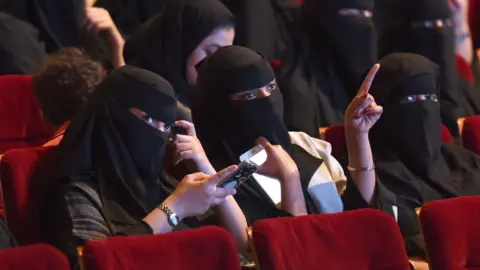Saudi cinema screens reopen on 18 April 'with Black Panther'
 AFP
AFPSaudi Arabia's first cinema in more than 35 years will open on 18 April, showing the action movie Black Panther.
It is part of a deal done with the world's biggest cinema chain, AMC, to open up to 40 cinemas in some 15 Saudi cities over the next five years.
The past year has seen the start of a huge drive to bring entertainment to Saudi Arabia as part of Vision 2030.
That is the ambitious plan for economic and social reform by the Crown Prince Mohammed bin Salman.
The conservative Muslim kingdom had cinemas in the 1970s, but they were closed at the behest of hardline Islamic clerics.
Last year, Grand Mufti Sheikh Abdul Aziz al-Sheikh reportedly warned of the "depravity" of cinemas, saying they would corrupt morals if allowed.
Saudi Arabia's royal family and religious establishment adhere to an austere form of Sunni Islam known as Wahhabism, and Islamic codes of behaviour and dress are strictly enforced.
Saudis are enthusiastic consumers of Western media and culture, but have been confined to watching privately, on their phones and via satellite television at home.
Both Saudi authorities and cinema operators believe there is a huge untapped market that could generate up to $1bn (£710m) in annual ticket sales through some 350 theatres by 2030.
The first screen to open will be in the King Abdullah Financial District of the capital, and a source told Reuters news agency the first film shown would be Marvel superhero blockbuster Black Panther.
The source also said that cinemas would not be segregated by gender, as is normally required in public venues. It is unclear, however, what kind of movies will be permitted - and it is likely that some will be censored.
Vision 2030 is intended to help divert the Saudi economy from its dependence on oil, provide new jobs and give Saudis a reason to spend their money at home rather than abroad.
The 32-year-old crown prince, who is currently in the US drumming up investment, unveiled the programme last year. It aims to increase household spending on cultural and entertainment activities in the oil-dependent kingdom from 2.9% to 6% by 2030.
Prince Mohammed has also announced that women will be permitted to drive in Saudi Arabia for the first time from June 2018 - another move opposed by conservative clerics,
He has also cracked down on dissent and launched an anti-corruption drive that has seen hundreds of people, among them senior princes and prominent businessmen, detained and offered pardons in exchange for financial settlements with the state.
However, critics say his actions have also served to subdue some political opponents, and say his economic and social reforms have not been matched by political ones.
